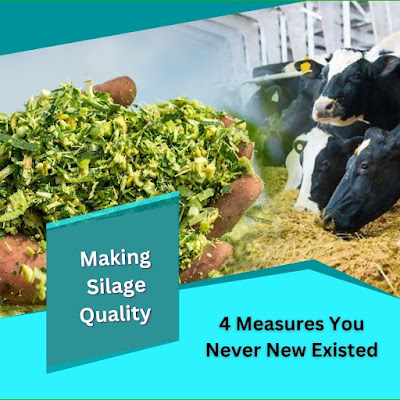Method to Get Perfect Wheat Silage for Cows and Buffaloes
The focus on
quality wheat silage production has
been a major concern in recent years, among the breeders and the producers. For
the silage to have the necessary quality, it is important to invest time, money
and make assertive planning. If you still have questions about silage
production, we have gathered all the most relevant information.
Planning is essential to have quality
The production of
quality wheat silage involves some very important factors, with emphasis on
prior knowledge of the costs and risks involved. Only with this knowledge is it
possible to make relevant planning. The great secret of producing good silage
lies in the speed of the process. In the weeks prior to harvesting the wheat silage,
the producer must perform the machinery overhaul procedure. It is necessary to
check the hoses, the greases, and the oil level and so on. It is important to
make sure that everything is working as it should when harvesting.
Wheat silage is important for cattle
The wheat Silage
is not just food for cow and buffaloes in times of drought. It is a relevant
source of nutrients. Thus, the producer must understand the silage production as an activity subject to
investment.
Soil Analysis – It may seem strange, but one
of the main problems that many farmers face is that of not analysing the soil
on which they will grow their crops. Without this analysis, you cannot have
knowledge about what needs to be corrected in the cultivation and future
harvest. The silage crop wheat
silage needs specific nutrients for it to develop. To get an idea, it needs
foliar fertilization, in addition to conventional fertilization, so that it can
receive microelements. It is a fertilization procedure that must be carried out
between stages V6 and V8, which represent the phases in which the plant has 6
and 8 leaves.
Soil Preparation – The most suitable type of
planting for wheat silage is no-till, as it allows soil moisture to be
maintained. A better planned structure and better compaction. To perform
no-tillage it is recommended to have knowledge about green cover for each type
of region, specific planters, as well as drying methods.
Harvesting the silage – The harvesting process for
wheat silage involves a series of operations, among which are: cutting the crop
plants, chopping these plants, unloading the plants, in addition to unloading
them in their proper silos. The
determination of the cut size will be made considering some factors, such as
the type of gear to be used, as well as the sharpening of the knife.
Conclusion: Choose the best wheat silage production
When it comes to
choose the premium quality wheat silage for the cattle, it is always ideal to
choose the best supplier. Precise nutritional balance, Highest Quality Feed and
Innovative Packaging: these are the three pillars that makes the reputation of
this brand. From using exclusive European machineries to cultivate the silage
to integrated operations, “NUTRIMEAL” offers the cattle owners a
trustworthy experience. When it comes to nutrition, we are the best in India.



Comments
Post a Comment